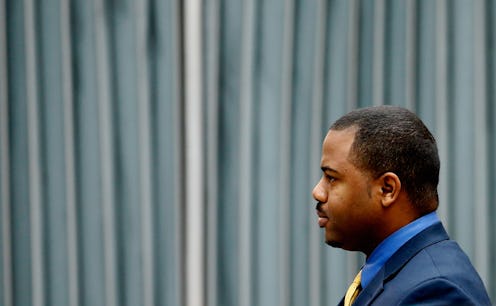News
Officer Convictions Really Are That Rare
After a nearly eight-month wait for a verdict on whether the first of six Baltimore police officers would be convicted for their involvement in the death of 25-year-old Freddie Gray, the presiding judge on Wednesday declared officer William G. Porter's trial a mistrial. This doesn't necessarily mean the end for legal proceedings against Porter, and five more officers still are due in court, but Porter's mistrial represents a pattern when it comes to convictions against officers for fatal shootings. Just how often are police officers convicted in the U.S.?
It's not often that officers even face charges for on-duty violence or shootings. As of April, only 54 police officers had been charged with crimes since 2005, though thousands of fatal police shootings occurred in the last decade, according to a report by The Washington Post.
According to former police officer and Bowling Green State University researcher, Philip Stinson, FBI officials recorded several thousand justifiable homicides by police officers between 2005 and 2011, BBC News reported in April. Stinson found that, from this number, 41 officers were charged with murder or manslaughter. And according to the Post's report, the majority of officers who had been charged were acquitted or cleared.
Why officers rarely see convictions or sentences is up for debate, though. "The reason is because it's usually justified," William Johnson, executive director of the National Association of Police Organization, told The Wall Street Journal in 2014. Johnson said that oftentimes officers' claims of self-defense are legitimate.
But in his research, Stinson said jurors typically "don't want to second guess" the decisions made by officers, even in incidents that turn violent. This is why juries tend to give police officers "every possible benefit of the doubt," according to Stinson.
This may be a reason for why, then, evidence must be overwhelming in order for an officer to be convicted for a fatal encounter that took place while they were on duty. The trial against former Chicago officer Jason Van Dyke, who fatally shot 17-year-old Laquan McDonald more than a dozen times, may make for one of those rare instances where an officer is convicted. The tragic death was captured on camera.
The numbers say, though, that despite the consistently low rate of convictions, there's already been a turning point for officer accountability in cases of homicide or manslaughter. According to The Atlantic, Stinson's data showed the rate of officers charged for on-duty killings of any kind between April and August was five times the rate from 2005 to 2011, which was an average of 6.5 cases each year.
The fact that six officers all faced various charges related to Freddie Gray's death serves as one example. Whether this uptick in indictments will lead to an eventual rise in convictions remains to be seen, as trials for police shootings play out in courtrooms around the country.
